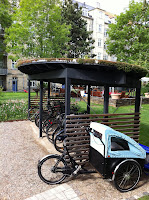The bike proved its worth in the weeks after the February earthquake. It was used to deliver food parcels all over the steep streets, and to deliver prescriptions from the pharmacy. An electric bike could go where cars couldn't, as many streets were partially blocked by debris. And lots of people were riding out the aftershocks at home and could not have made it down to the shops or civil defence centre. Lyttelton was reasonably isolated at this time, so using the cargo bike meant people could conserve petrol.
Now, some of you may be interested in the nuts and bolts of it. The prototype bike was handbuilt by Josh Harris of pedalOn mobile bicycle services, using part of an old adult bike frame, part of a child's bike frame and some steel tubing from a washing line manufacturer. It was adapted to its current electric form by the addition of an electric motor and battery unit from The Electric Bicycle Company. The battery is a 10 amp hour lithium ion and can be charged from either mains or solar power. At full charge it lasts for up to 30 km. There are two batteries available that can be interchanged to allow continuous use. The gear ratios are sufficient to get up even the steepest streets in Lyttelton, and are capable of carrying quite a load (two bales of pea straw are the biggest so far!).
Future use of the cargo bike could include deliveries from the Farmer's Market, pharmacy, supermarket, Lyttel Piko, garden supplies, pizza, fish'n'chips, moving house:










No comments:
Post a Comment